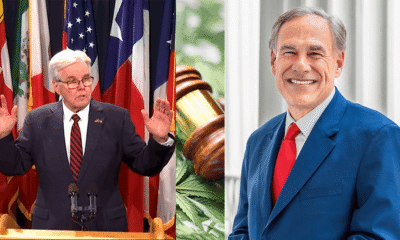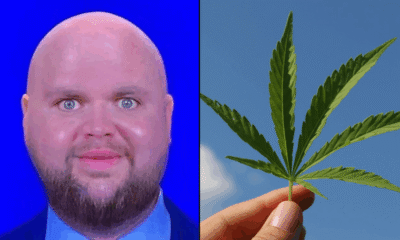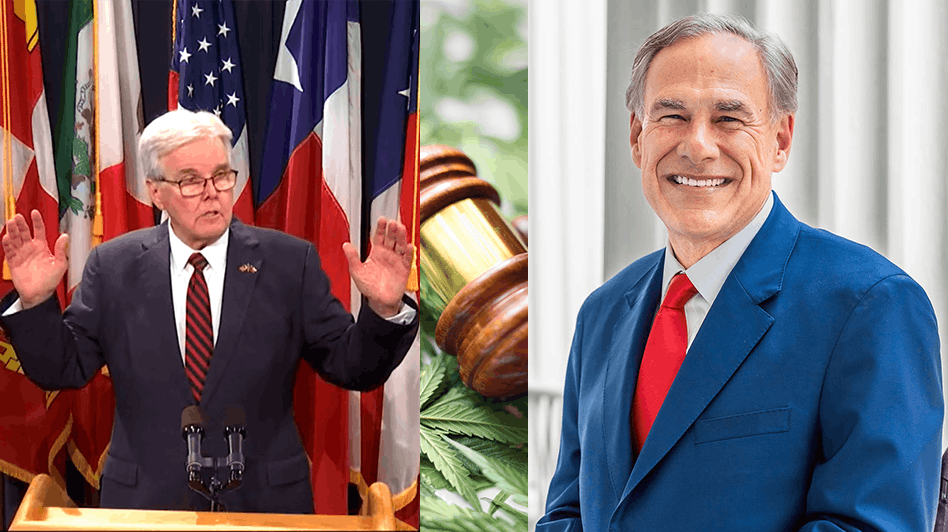featured
Marijuana Opponents ‘Have Lost’ The Debate, GOP Senator Says, Arguing ‘It’s Time’ To Regulate It Like Alcohol And Tobacco
Published
6 hours agoon

A GOP senator says opponents of marijuana legalization “have lost” the fight to maintain prohibition and that “it’s time” for lawmakers to address that reality by creating a regulatory framework treating cannabis “in the same way that we do with alcohol and tobacco,” so that states can set their own policies without federal intervention.
During a Senate Judiciary Committee hearing on Tuesday that featured witnesses from the Drug Enforcement Administration (DEA), Department of Homeland Security (DHS) and the Federal Bureau of Investigation (FBI), Sen. Thom Tillis (R-NC) pressed the DEA representative on cannabis policy issues.
“I have tried to keep pounding the table and saying, ‘Folks, those of us who were not necessarily eager to legalize pot have lost,’” the senator said. “The majority of states have legalized it at some level or another. I don’t really have a whole lot of emotions about it personally, but for the fact that I don’t think we’re regulating it properly, and I do believe it’s just become another distribution channel for the cartels.”
Tillis seemed to be arguing that the absence of federal regulations, and the policy disconnect with states that have increasingly enacted legalization, has created a vacuum that’s allowed illicit operators to thrive.
“We’ve got to get this under control. We have to realize that pot is going to be legal in this country in one form or another, and virtually every other state,” he said. “We can either figure out how to regulate it by putting a U.S. Department of Agriculture regimen in [and] an [Food and Drug Administration, or FDA] regimen in the same way that we do with alcohol and tobacco are.”
Watch the senator’s remarks on cannabis policy at the hearing in the video below, starting around 2:11:00:
“We’re going to get way down the road without control over inputs, and the next thing the cartels are going to do is figure out how they can put—in the race for potency, once they run out of how you can actually do this through the plants, they’re going to figure out some way to make this more potent and more deadly,” the senator said.
He also said that he feels “very strongly that we need to have a separate meeting about how do we create a construct that, if states want to opt into, they can—not make it legal federally—or this is getting out of control.”
The senator also spent time pressing DEA Special Agent in Charge Los Angeles Field Division Matthew Allen on an issue in his home state, where the Eastern Band of Cherokee Indians has legalized both medical and adult-use cannabis while the rest of the state remains under a system of broad prohibition.
Despite repeatedly calling for a federal regulatory structure for marijuana, Tillis has consistently taken issue with the policy disconnect between state, federal and tribal governments. However, he said he recognizes “they have a right to sell marijuana, I guess, as a as a recognized tribe.”
“But they’re growing in one place and selling in another place. Not only are they—and let’s face it, folks, it’s a casino operation. It’s a destination. People are buying this stuff,” he said, referring to the Cherokees’ land, called the Qualla Boundary. “You’d have to be out of your mind to think that they’re going to dispose of whatever is not used by the time they leave.”
It’s an “anomaly” that represents “one example of what happens when Congress fails to act on something that I think it’s time for us to act on,” Tillis said.
—
Marijuana Moment is tracking hundreds of cannabis, psychedelics and drug policy bills in state legislatures and Congress this year. Patreon supporters pledging at least $25/month get access to our interactive maps, charts and hearing calendar so they don’t miss any developments.![]()
Learn more about our marijuana bill tracker and become a supporter on Patreon to get access.
—
Back in February, the senator also raised the issue during a Senate Banking Committee hearing, saying “we should reexamine [federal marijuana laws].” But at the same time, “we damn sure shouldn’t do it by passing” legislation that would simply prevent federal regulators from penalizing banks that work with state-legal cannabis businesses.
“If somebody wants to work on rules of the road and do that—and bank the industry in a cohesive, sustainable way that doesn’t kind of skirt around the fact that it’s still illegal at the federal level—count me in. Happy to do it,” Tillis said.
Tillis also said last December that he’s hopeful Congress will have a “discussion” about potentially creating a federal regulatory framework for marijuana in 2025, though he added that he personally wouldn’t vote to federally legalize cannabis.
Last July, the senator separately said that he supports creating a “comprehensive regulatory framework that treats marijuana just like tobacco,” arguing that “the federal government needs to figure out a safe way to allow this market to occur.”
The latest remarks in the Senate committee hearing come about two months after Rep. Dave Joyce (R-OH) once again introduced the Preparing Regulators Effectively for a Post-Prohibition Adult-Use Regulated Environment Act (PREPARE) Act, which would direct the attorney general to create a commission charged with making recommendations on a regulatory system for cannabis that models what’s currently in place for alcohol.
Photo courtesy of Brian Shamblen.

Author: mscannabiz.com
MScannaBIZ for all you Mississippi Cannabis News and Information.
You may like
-


Summers are better with Flav
-


Nebraska Medical Cannabis Commission Proposal Will ‘Destroy Patient Access,’ Advocates Say
-


Circuit Court Ruling for Arkansas Renders Texas Governor’s Hemp Veto Argument Moot
-


Jones Soda Co. Sells Mary Jones THC Beverage Brand
-


Feds Say Tourist Who Admitted To Prior Marijuana Use In Legal Places Was Denied Entry To US Over Drugs—Not Bald JD Vance Meme
-


The PFAS Threat in Cannabis and Hemp: What You Need to Know
featured
Nebraska Medical Cannabis Commission Proposal Will ‘Destroy Patient Access,’ Advocates Say
Published
16 minutes agoon
June 25, 2025
“I believe it is another direct and intentional step that they are taking to absolutely destroy patient access to medical cannabis.”
By Zach Wendling, Nebraska Examiner
It’s unclear what requirements the state commission to regulate medical cannabis in Nebraska might enact to license such operations by this fall, ahead of a deadline next week for detailing the criteria for applications.
The Nebraska Medical Cannabis Commission has until July 1 to write licensing criteria under state law. But as commissioners gear up for their next meeting Thursday, the first with all five commissioners, they have indicated they will consider adopting draft or emergency criteria to accept or deny licensing applications after July 1.
Licensing must begin by October 1, the same time any other requirements for medical cannabis must be enacted, according to a pair of laws that voters overwhelmingly approved in a pair of November ballot measures.
However, with just hours until the next commission meeting, there is no specific indication of what criteria the board will consider.
Also on the agenda is a legal “memorandum of agreement” to help with future rulemaking involving the Nebraska Department of Health and Human Services (DHHS) and Gov. Jim Pillen’s (R) Policy Research Office, the policy lobbying arm of the state’s chief executive.
No draft rules or regulations, including licensing criteria, have yet been made public.
Crista Eggers, executive director of Nebraskans for Medical Marijuana, which has led medical cannabis ballot measures since 2020, said she’s faced a lack of transparency and been unable to reach the commission or have questions answered in recent weeks, leaving many advocates “extremely frustrated.”
“I didn’t know we could be more frustrated than what we have been previously, but there just seems to be a new layer added every single day,” Eggers said Tuesday.
A legal ‘memorandum of agreement’
Final regulations can’t be approved this week because state law requires 30 days of notice before a public hearing on proposed guidelines. If there are no major changes after that, and the commission approves the guidelines, the governor and Attorney General Mike Hilgers (R) would have final say.
A copy of the proposed “memorandum of agreement” obtained by the Nebraska Examiner indicates that the commission will consider contracting with DHHS for “legal services,” such as providing research, administration and enforcement of commission duties. It could also recommend draft legislation or policies, advise on legal impacts and participate in the rulemaking process.
DHHS CEO Steve Corsi, Policy Research Director Kenny Zoeller and Dr. Monica Oldenburg, who chairs the Medical Cannabis Commission, would enter the agreement if adopted Thursday.
Oldenburg did not respond to a request for comment ahead of the meeting.
The Attorney General’s Office has already pledged to sue the Medical Cannabis Commission if and when it begins medical cannabis licensing. Office spokesperson Suzanne Gage said Tuesday that the office will provide legal support and guidance to the Medical Cannabis Commission, as it does to other agencies and commissions.
The commissioners are already being sued by a former state senator alleging that the Nebraska laws violate federal law that classifies marijuana as a Schedule I drug that has a high potential for abuse and “no currently accepted medical use.”
Pillen and Corsi, as well as Eggers and other ballot sponsors, are among those named in that lawsuit. A Lancaster County District Court judge is considering whether to dismiss the case.
DHHS: ‘Cannabis is not a medication’
The ballot measure that Eggers’s organization led through November 2024 was designed to sidestep DHHS, because officials of the state health agency have “adamantly” opposed legalization over many years. That includes March, when DHHS again opposed legislation, led by Republican State Sen. Ben Hansen of Blair and supported by Eggers and other longtime advocates, to help clarify the process for implementing the ballot initiatives.
Dr. Roger Donovick, executive medical officer for DHHS, said at a March legislative hearing: “DHHS maintains that cannabis is not a medication and does not agree with its legalization.”
Under the ballot measures, any health care practitioner can recommend that patients or caregivers legally possess up to five ounces of medical cannabis. Cannabis can’t yet be legally purchased in Nebraska, and some advocates have turned to health care providers in neighboring states for authorization.
Eggers said the legal memorandum would give “almost full authority” to DHHS to take over the rulemaking, which the campaign never intended and which voters never considered.
Instead, voters legalized medical cannabis and created the five-member Nebraska Medical Cannabis Commission, made up of three governor-appointed members of the Nebraska Liquor Control Commission and up to two more members also appointed by the governor.
Eggers said that was because the Liquor Control Commission has had a good track record of regulation and has valued the necessity of safeguards and of providing guidance to law enforcement.
“I believe it is another direct and intentional step that they are taking to absolutely destroy patient access to medical cannabis,” Eggers said of involving DHHS.
‘Another gut punch’
A DHHS spokesperson confirmed Tuesday that the agency has neither issued any guidance related to medical cannabis nor received any complaints against physicians related to the new laws since they took effect in mid-December.
“DHHS will adhere to state statute and follow regulations and licensing processes implemented by the Nebraska Cannabis Commission,” said Jeff Powell, DHHS director of communications.
Eggers said DHHS, however, has looked at cannabis as a “farce.” She laid the blame for the confusion and lack of transparency at the feet of Hilgers and Pillen. Hilgers led opposition to the most recent legislative bill that advocates rallied behind. It fell 10 votes short last month.
“Talk about another gut punch to the people of this state,” Eggers said. “And the ultimate gut punch is to the patients that are waiting at home, that have hope that on Thursday we are one step closer to access, but what I think we see rolling out here is that the day that they receive access is getting farther and farther and farther away.”
Some lawmakers who backed the hands-off legislative recommendation from Hilgers, as well as U.S. Sen. Pete Ricketts (R-NE), a former governor, did so partly because they first wanted to see what the Medical Cannabis Commission would do.
A separate legislative attempt to shield physicians from possible civil, criminal or professional liability from recommending medical cannabis also failed last month.
Public comment desired
Eggers said she understands patients and advocates are tired and may feel as though their voices aren’t being heard, but she said families, loved ones, neighbors and children still need Nebraskans to get loud and show up.
She said Nebraskans have a right and a duty to be part of the process. Commissioners have said they want to hear from the public, too.
“At some point, I do believe that lawmakers and state officials who are doing everything in their power to stand in the way of this and to ignore the voice of the people, to stand in the way of the will of the people, I do believe they lose at some point,” Eggers said. “But at this point, they’re winning, and Nebraskans should be absolutely disgusted…with how this is being handled.”
The Medical Cannabis Commission will meet at 10 a.m. Thursday in the first-floor hearing room of the Nebraska State Office Building in Lincoln, 301 Centennial Mall South.
Commissioners at their first meeting June 9 preliminarily approved public comment periods of up to one hour and three minutes per speaker, though a majority of the commission can change how the public participates. Written comments can be submitted to [email protected].
This story was first published by Nebraska Examiner.
Photo courtesy of Philip Steffan.

Author: mscannabiz.com
MScannaBIZ for all you Mississippi Cannabis News and Information.
featured
Circuit Court Ruling for Arkansas Renders Texas Governor’s Hemp Veto Argument Moot
Published
1 hour agoon
June 25, 2025
A federal court vacated a preliminary injunction on June 24 that had been blocking Arkansas from implementing a ban on certain hemp-derived cannabinoids, including delta-8 THC, for the past two years.
Arkansas Gov. Sarah Huckabee Sanders signed Senate Bill 358 (Act 629) into law in April 2023, legislation to prohibit intoxicating hemp-derived cannabinoids by classifying a list of tetrahydrocannabinols as Schedule VI substances in the state. That list included delta-8, delta-9 and delat-10 THC, among other compounds.
The intent of the Arkansas General Assembly and Sanders was to stop the production and sale of intoxicating substances derived from federally compliant industrial hemp, as defined under the 2018 Farm Bill. State lawmakers and the governor specifically had concerns with products derived from industrial hemp that were produced as a result of a synthetic chemical process.
While Act 629 took effect in August 2023, U.S. District Judge Billy Roy Wilson placed a preliminary injunction on its implementation five weeks later after a quartet of cannabis-related businesses filed a lawsuit claiming that the ban violates the U.S. Constitution’s Supremacy, Due Process, Takings and Commerce clauses.
The plaintiff businesses include Bio Gen LLC, Drippers Vape Shop LLC, Cigarette Store LLC (d/b/a Smoker Friendly) and Sky Marketing Corp. (d/b/a Hometown Hero)—collectively, “Bio Gen.”
Wilson also denied a motion to dismiss that Sanders, Attorney General Tim Griffin and other Arkansas officials filed in the Eastern District Court. In part, the district court judge ruled that Bio Gen would likely succeed on the merits of its Supremacy Clause claim because the 2018 Farm Bill likely preempted Act 629.
However, the U.S. Court of Appeals for the Eighth Circuit reversed the lower court’s ruling this week, dealing a victory to the Arkansas officials.
“The text of the 2018 Farm Bill shows only that Congress wanted to facilitate state legalization of hemp, if a state wants to. Congress allows states to legalize hemp by removing the biggest hurdle—federal criminalization,” Eighth Circuit Judge Jonathan Allen Kobes wrote in the June 24 ruling.
Kobes said that, under the 2018 Farm Bill, Congress authorized the U.S. Department of Agriculture to allow states to apply for and receive the primary regulatory authority over their in-state hemp production programs.
Under the 2018 Farm Bill, states cannot interfere with the interstate commerce of hemp by preventing the continuous transportation of federally compliant materials through their borders. The Eighth Circuit ruled that Act 629 does not do that.
“The [2018 Farm Bill] text does not support Bio Gen’s claim that Congress intended to ‘federally protect hemp’ and coercively mandate nationwide legality,” the judge wrote. “States may obtain primary regulatory authority over hemp production. And with that primary regulatory authority, states may ‘regulate the production of hemp’ in any manner ‘more stringent than [the 2018 Farm Bill].’”
In other words, it’s the Eighth Circuit Court’s opinion that just because states may legalize hemp under the 2018 Farm Bill does not mean they are required to, nor does it mean they have to utilize the federal definition of hemp: a plant that tests at or below 0.3% delta-9 THC by dry-weight during a pre-harvest field test.
“This is a huge victory for the state and a great step towards protecting generations of Arkansas’ children from the dangers of synthetic marijuana,” Sanders said on social media following Tuesday’s court decision.
The American Trade Association for Cannabis and Hemp (ATACH), which filed an amicus brief in December 2023 supporting Arkansas officials, provided a statement to Cannabis Business Times in support of the Eighth Circuit’s decision.
“ATACH welcomes today’s Eighth Circuit ruling, which affirms the right of states to regulate intoxicating hemp-derived products and provides clarity to state lawmakers seeking to address these products in their states,” ATACH Vice President of Policy Chris Lindsey said.
The Eighth Circuit’s opinion holds jurisdiction in seven states: Arkansas, Iowa, Minnesota, Missouri, Nebraska, North Dakota and South Dakota.
Still, when Texas Gov. Greg Abbott vetoed legislation late Sunday night that would have banned consumable hemp products with trace amounts of THC in the Lone Star State, he pointed to neighboring Arkansas.
In his veto proclamation, Abbott argued that had he signed Senate Bill 3, its enforcement would have been enjoyed for years, leaving public health and safety concerns related to intoxicating hemp products unaddressed.
“In 2023, Arkansas enacted Senate Bill 358, which (like this bill) would have criminalized hemp products that Congress expressly legalized in the 2018 Farm Bill,” Abbott wrote on June 22, two days before the Eighth Circuit’s ruling.
“[The 2018 Farm Bill] converted hemp and hemp products from contraband to lawful commodities. The Arkansas law was challenged, and a federal court swiftly halted it in its entirety, finding it was likely preempted by federal statutes and that its criminal provisions were likely unconstitutionally vague,” Abbott wrote. “The result in Arkansas? Their law has sat dormant, meaningless, having no effect for nearly two years while further legal proceedings play out. That result must be avoided in Texas.”
RELATED: Texas Governor Vetoes Ban on Hemp Products, Calls For Special Session to Regulate THC
Instead of signing S.B. 3 to prohibit intoxicating hemp products in Texas, Abbott included the legislation as one of five bills for legislators to address during a 30-day special session slated to begin July 21, recommending they instead craft a regulatory framework for hemp products similar to alcohol.
The following day, Texas Lt. Gov. Dan Patrick, who spearheaded S.B. 3’s passage as the presiding officer in the state Senate, accused his GOP ally in the governor’s office of wanting to “legalize recreational marijuana.”
“That’s the headline, folks, because that’s what his proclamation does,” Patrick said during a June 23 press conference. “Now, whether it’s unintentional and he didn’t think through it, or whether it’s intentional, that’s the result of the veto.”
Patrick also questioned whether the state’s hemp businesses were running terrorist or cartel money laundering schemes, claiming that someone told him to “I better watch my step.” The lieutenant governor also asked, “Who convinced [Abbott] on his staff from the outside to kill Senate Bill 3?”
Patrick also reaffirmed that the governor indicated to him that he would sign S.B. 3, saying that he was puzzled by the last-minute veto because of the broad support for the legislation by lawmakers and law enforcement officials.
Patrick pointed to the 105 of 108 Republicans in the Texas Legislature who supported S.B. 3, suggesting that Abbott should have respected that near-unanimous backing for the bill.
“The governor and I will work together in the future, and we’ll disagree from time to time, but this is a fight that didn’t need to be,” he said.
Patrick also targeted Abbott’s inclusion of the Arkansas injunction in his veto proclamation, calling into question the governor’s argument that S.B. 3 would be subject to “valid constitutional challenges.” Abbott leaned on his background as a former Texas Supreme Court Justice and state attorney general in making that conclusion.
Despite Abbott’s law background, Patrick said the governor’s argument was “flawed.”
“We believe the Eighth Circuit will stand with Arkansas,” said Patrick, whose prediction came true the next day. “And so, if that happens while we’re going through this charade, then what’s the governor going to say? ‘Oh, I guess I was wrong about Arkansas?’”
Patrick said it should not matter if the same legal battle unfolds in the U.S. Fifth Circuit Court of Appeals, which holds jurisdiction over Texas.
“Since when did we care who sued us when we passed a bill?” the lieutenant governor asked. “We deal with lawsuits all the time, so that shouldn’t be a surprise.”
Following the Eighth Circuit Court’s ruling on June 24, Patrick posted an I-told-you-so message on X, indicating that he’ll fight to maintain S.B. 3’s prohibition language in the upcoming special session.
“As I said yesterday at my press conference, it appeared to my legal team and me that Arkansas would win this case and be able to ban THC,” he wrote. “It won’t be long before 8,000 smoke and vape shops will be out of business in Texas. All we have to do is pass S.B. 3, just like we passed during the regular session.”

Author: mscannabiz.com
MScannaBIZ for all you Mississippi Cannabis News and Information.

Seattle-based Jones Soda Co. has sold its hemp-based THC beverages brand Mary Jones to MJ Reg Disrupters for $3 million to “streamline operations and focus on its core soda offerings,” according to a press release.
Jones Soda unveiled its cannabis segment in 2022, launching Mary Jones first in California and then expanding the brand to other states. The company’s infused beverages contain hemp-derived delta-9 THC and cannabidiol (CBD).
MJ Reg Disrupters purchased Mary Jones with an initial June 19 cash payment of $489,399 plus an additional $2,510,610 via promissory notes over the next three years.
Jones Soda CEO Scott Harvey called the sale “an important milestone in our effort to focus our resources on areas where we see the strongest long-term growth and profitability.”
“We are proud of the innovation behind the Mary Jones brand, but I believe this divestiture enables us to sharpen our strategic priorities and accelerate investment in our core soda, functional beverage, and adult beverage categories.” — Harvey, in a statement
“We are excited about the opportunity to build on the Mary Jones legacy,” MJ Reg Director Joe Oblas said in the release. “Jones Soda created a unique and high-quality product, and we are committed to continuing its innovation and reach.”
Get daily cannabis business news updates. Subscribe
Have an additional perspective to share? Send us a message to let us know, and if your comment is chosen by our editors it could be featured here.
Perspective to add? Suggest a revision or submit commentary for review using the form below.
Ganjapreneur is made possible by our partners:

Author: mscannabiz.com
MScannaBIZ for all you Mississippi Cannabis News and Information.

Summers are better with Flav

Nebraska Medical Cannabis Commission Proposal Will ‘Destroy Patient Access,’ Advocates Say

Circuit Court Ruling for Arkansas Renders Texas Governor’s Hemp Veto Argument Moot

Jones Soda Co. Sells Mary Jones THC Beverage Brand

Feds Say Tourist Who Admitted To Prior Marijuana Use In Legal Places Was Denied Entry To US Over Drugs—Not Bald JD Vance Meme

The PFAS Threat in Cannabis and Hemp: What You Need to Know

Chicago Police Can’t Search Vehicles Based on Smell of Raw Cannabis Under New Rules

Marijuana Opponents ‘Have Lost’ The Debate, GOP Senator Says, Arguing ‘It’s Time’ To Regulate It Like Alcohol And Tobacco

How much do you know about Pennsylvania’s medical marijuana program? Take our quiz.

Verano Unveils Bodega-Style Dispensary Experience at Zen Leaf Cave Creek in Phoenix

Congress to vote on cannabis & psychedelics amendments this week (Newsletter: June 25, 2025)

Rockford teen intended to deliver 300+ grams of cannabis, police say

El Paso cannabis shops relieved after Gov. Abbott vetoes ban on THC products

More older adults are using cannabis, study says

Marijuana use rising among seniors, and doctors are sounding alarms

More older Americans are using marijuana, according to new data

With Texas Hemp Ban Now Vetoed By Governor, Industry And Lawmakers Turn To Regulation

House To Vote On Letting VA Doctors Recommend Medical Marijuana To Military Veterans And Supporting Psychedelics Research

Montana Governor Rejects Bill To Let Tribes Negotiate Marijuana Regulations With State

Texas Lt. Gov. puzzled by veto of THC ban, says Gov. Abbott wants to legalize marijuana – NBC 5 Dallas-Fort Worth

What strains would these queer icons smoke?

RFK Says Trump Administration Could Provide Psychedelic Therapy To Military Veterans ‘Within 12 Months’

Texas’s Dan Patrick vows to keep fighting against THC after Abbott vetoes ban

Why more seniors are turning to cannabis

Alert: Department of Cannabis Control updates data dashboards with full data for 2023

Connecticut Appoints The US’s First Cannabis Ombudsperson – Yes there is a pun in there and I’m Sure Erin Kirk Is Going To Hear It More Than Once!

5 best CBD creams of 2024 by Leafly

Free delta-9 gummies from Bay Smokes
New Study Analyzes the Effects of THCV, CBD on Weight Loss

EU initiative begins bid to open access to psychedelic therapies

Mississippi city official pleads guilty to selling fake CBD products

May 2024 Leafly HighLight: Pink Runtz strain

Curaleaf Start Process Of Getting Their Claws Into The UK’s National Health System – With Former MP (Resigned Today 30/5/24) As The Front Man

5 best autoflower seed banks of 2024 by Leafly

Horn Lake denies cannabis dispensary request to allow sale of drug paraphernalia and Sunday sales | News

Discover New York’s dankest cannabis brands [September 2024]

Nevada CCB to Accept Applications for Cannabis Establishments in White Pine County – “Only one cultivation and one production license will be awarded in White Pine County”

Press Release: CANNRA Calls for Farm Bill to Clarify Existing State Authority to Regulate Hemp Products

Local medical cannabis dispensary reacts to MSDH pulling Rapid Analytics License – WLBT

6 best CBD gummies of 2024 by Leafly

5 best THC drinks of 2024 by Leafly

The Daily Hit: October 2, 2024

5 best delta-9 THC gummies of 2024 by Leafly

People In This State Googled ‘Medical Marijuana’ The Most, Study Shows

Weekly Update: Monday, May 13, 2024 including, New Guide for Renewals & May Board meeting application deadline

Thailand: Pro-cannabis advocates rally ahead of the government’s plan to recriminalize the plant

PRESS RELEASE : Justice Department Submits Proposed Regulation to Reschedule Marijuana

Press Release: May 9, STIIIZY and Healing Urban Barrios hosted an Expungement Clinic & Second Chance Resource Fair
Trending
-

 California Cannabis Updates1 year ago
California Cannabis Updates1 year agoAlert: Department of Cannabis Control updates data dashboards with full data for 2023
-

 Breaking News1 year ago
Breaking News1 year agoConnecticut Appoints The US’s First Cannabis Ombudsperson – Yes there is a pun in there and I’m Sure Erin Kirk Is Going To Hear It More Than Once!
-

 best list11 months ago
best list11 months ago5 best CBD creams of 2024 by Leafly
-

 Bay Smokes12 months ago
Bay Smokes12 months agoFree delta-9 gummies from Bay Smokes
-

 cbd1 year ago
cbd1 year agoNew Study Analyzes the Effects of THCV, CBD on Weight Loss
-

 Business9 months ago
Business9 months agoEU initiative begins bid to open access to psychedelic therapies
-

 Mississippi Cannabis News1 year ago
Mississippi Cannabis News1 year agoMississippi city official pleads guilty to selling fake CBD products
-

 California1 year ago
California1 year agoMay 2024 Leafly HighLight: Pink Runtz strain




